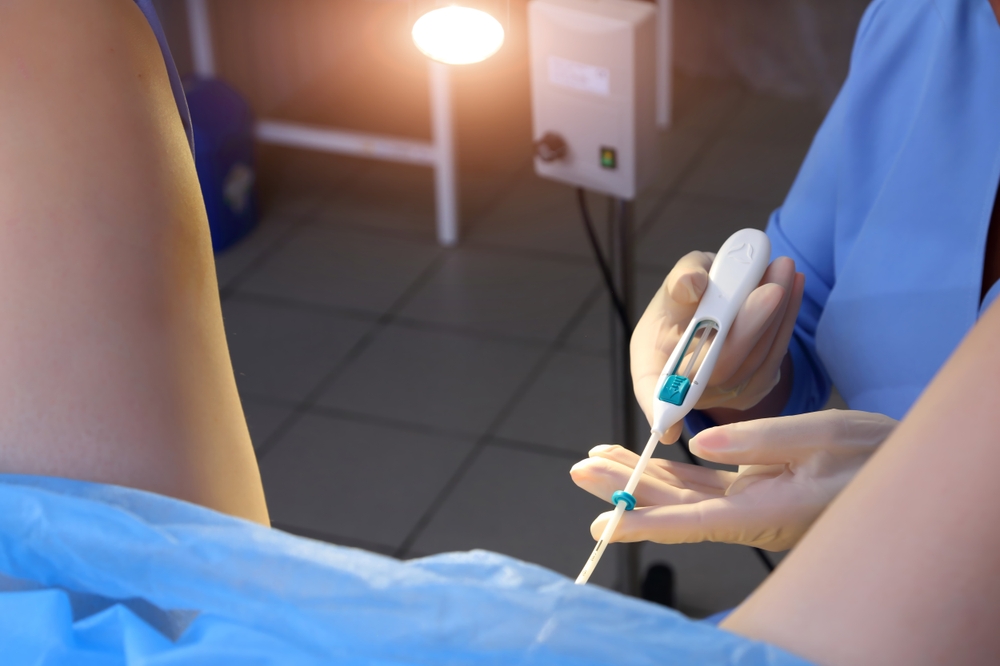CooperSurgical, the pharmaceutical company behind the Paragard intrauterine device (IUD) has announced a new insertion process. The inserter, approved by the Food and Drug Administration earlier this year, has a built-in loading tip and single-hand functionality to simplify Paragard’s placement.
An IUD is a small, T-shaped plastic device placed in the uterus that provides continuous birth control. CooperSurgical’s new inserter uses the IUD’s packaging tray to fold its T-shaped “arms” against its stem. The medical provider then slides a button forward to push the insertion tube over the tips of the arms. The tube has a flange, which marks the correct depth of placement within the uterus; once it’s positioned properly, the button automatically slides back to release the arms.
CooperSurgical said this new method “simplifies the placement procedure without compromising the reliability of Paragard itself.”
The Paragard IUD is one of several available long-acting reversible contraceptives. It is the only non-hormonal birth control currently available and has been used for more than 30 years. Paragard’s coiled copper wire releases copper ions that prevent sperm from fertilizing eggs. It does not have the same side effects associated with hormonal birth control and works for up to ten years.
The FDA’s approval of Paragard’s new placement system was based on data from a clinical trial sponsored by CooperSurgical. 117 women aged 18-49 years received the Paragard IUD via the new placement method. The device was successfully placed on the first and second attempts in 91% and 99% of participants, respectively. Complications occurred in less than 3% of participants. These included expulsion, improper positioning, partial uterine perforation, embedment in the uterine wall, and vasovagal reaction (stimulation of the vagus nerve that causes decreased heart rate and blood pressure).
The latest design update could make Paragard a more competitive choice against other IUDs at a time when demand for contraception is steadily climbing.
The popularity of long-acting reversible contraceptive methods surged after Donald Trump promised to repeal the Affordable Care Act (ACA) shortly before being elected president in 2016. The ACA mandates that insurance providers cover all FDA-approved birth control.
Shortly after the U.S. Supreme Court overturned Roe V. Wade in 2022, Planned Parenthood reported a 41% increase in IUD appointments.
Paragard IUD Injuries
The Paragard IUD has been linked to several reproductive injuries upon removal. In addition to the complications listed above, vaginal bleeding, fainting, seizures, pelvic inflammatory disease (PID), and life-threatening ectopic pregnancy can also occur.
CooperSurgical purchased Paragard from its original manufacturer, Teva Pharmaceuticals, in 2017.
In 2019, the FDA informed CooperSurgical that its Paragard advertisements failed to adequately warn patients of its possible risks. Thousands of women who suffered injuries after using the IUD began filing Paragard lawsuits against Teva Pharmaceuticals and CooperSurgical shortly after, claiming that a design flaw in the device made it break apart inside the uterus during removal. Many of these injuries required surgery; some even led to infertility.
CooperSurgical updated the Paragard label to include a warning about the risk of the IUD breaking apart, but patients were not notified of the update. Because patients don’t see the box the device comes in, they rarely see the warning label in the first place.
At the end of 2020, dozens of Paragard lawsuits were consolidated into multidistrict litigation (MDL), which puts all discovery and pretrial proceedings under one judge at one court for efficiency. Judge Leigh Martin May is overseeing the MDL in the U.S. District Court for the Northern District of Georgia, which has climbed to more than 2,600 active lawsuits.
Judge May recently granted a request by the defendants to complete general discovery simultaneously with bellwether discovery. Bellwether trials are conducted using a small number of individual cases to help predict the outcome of future trials.
Defendants must now certify the completion of discovery by March 15, 2025. Despite this deadline, the first bellwether trial is not scheduled to begin until December 1, 2025.
In 2022, the FDA issued another Paragard warning to CooperSurgical after inspecting one of its manufacturing facilities, but the company has yet to take action in response.
Women who were injured by the Paragard IUD should seek the help of an experienced personal injury attorney, ideally one with a successful case record in dangerous medical devices. A Paragard attorney can recover appropriate compensation for medical bills, lost wages and enjoyment of life, and pain and suffering.













